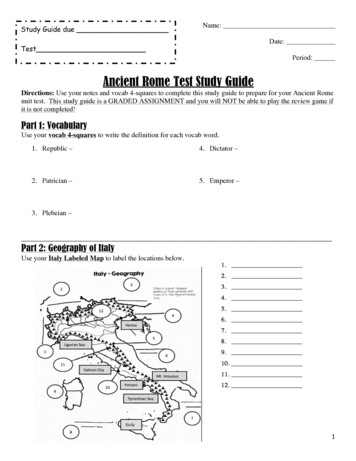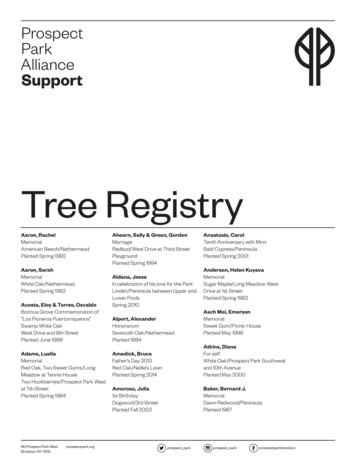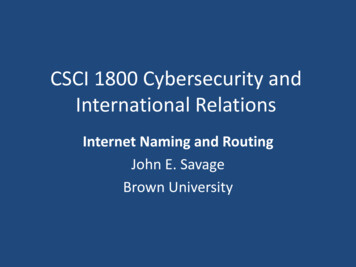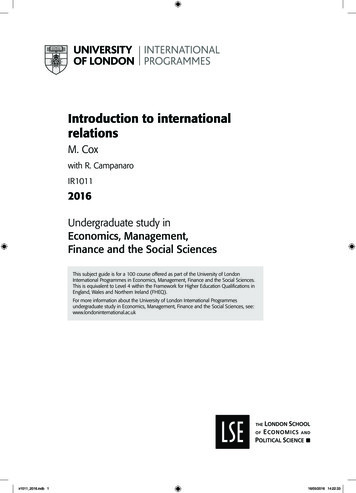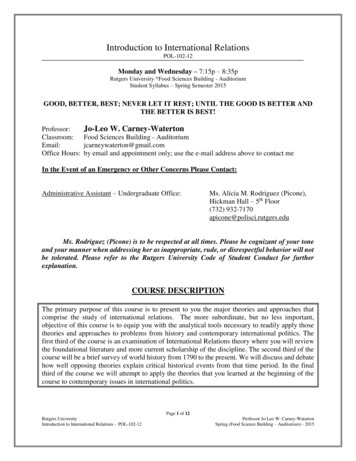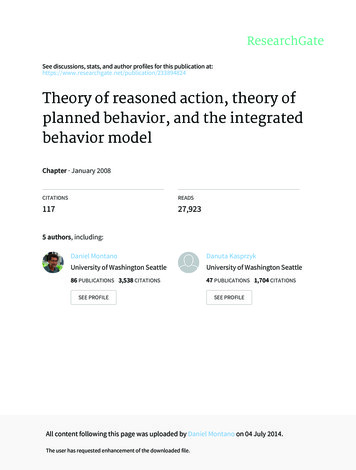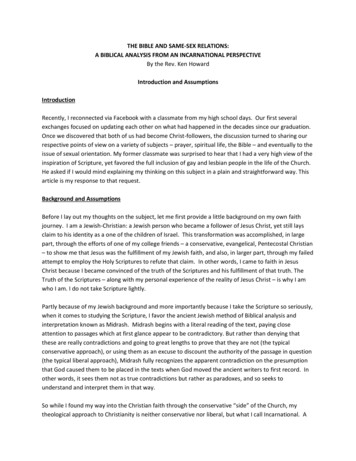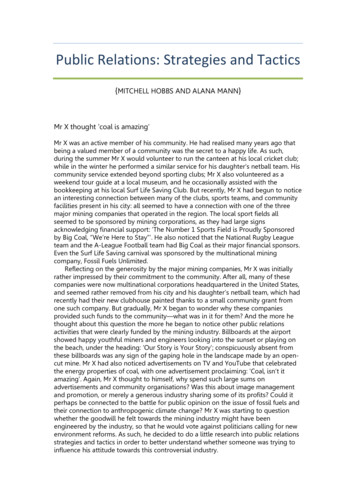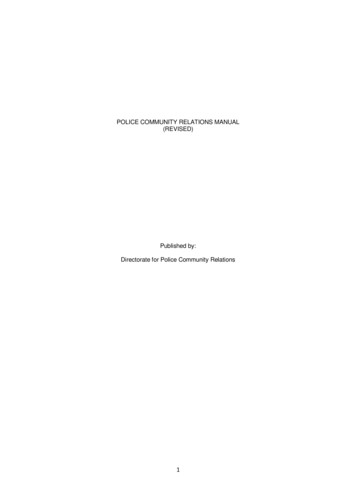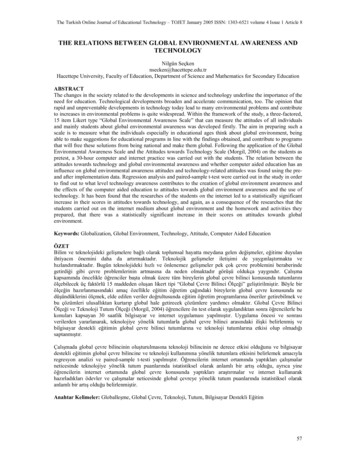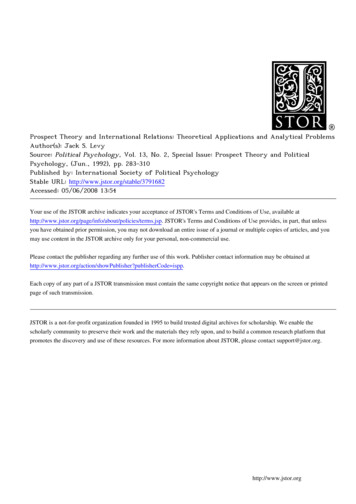
Transcription
Prospect Theory and International Relations: Theoretical Applications and Analytical ProblemsAuthor(s): Jack S. LevySource: Political Psychology, Vol. 13, No. 2, Special Issue: Prospect Theory and PoliticalPsychology, (Jun., 1992), pp. 283-310Published by: International Society of Political PsychologyStable URL: http://www.jstor.org/stable/3791682Accessed: 05/06/2008 13:54Your use of the JSTOR archive indicates your acceptance of JSTOR's Terms and Conditions of Use, available rms.jsp. JSTOR's Terms and Conditions of Use provides, in part, that unlessyou have obtained prior permission, you may not download an entire issue of a journal or multiple copies of articles, and youmay use content in the JSTOR archive only for your personal, non-commercial use.Please contact the publisher regarding any further use of this work. Publisher contact information may be obtained herCode ispp.Each copy of any part of a JSTOR transmission must contain the same copyright notice that appears on the screen or printedpage of such transmission.JSTOR is a not-for-profit organization founded in 1995 to build trusted digital archives for scholarship. We enable thescholarly community to preserve their work and the materials they rely upon, and to build a common research platform thatpromotes the discovery and use of these resources. For more information about JSTOR, please contact support@jstor.org.http://www.jstor.org
Political Psychology, Vol. 13, No. 2, 1992Prospect Theory and InternationalRelations:TheoreticalApplicationsand AnalyticalProblemsJack S. Levy1In this essay I evaluate the potential contribution of prospect theory to ourunderstandingof internationalrelations. I begin with the implications of lossaversion, the endowment effect, risk orientation, and framing for theoreticalquestions relating to the stability of the status quo in internationalpolitics,deterrence, bargaining, and preventive war. I then raise conceptual and methodological problems which complicate the theoreticaland empiricalapplicationof prospect theory to international behavior. I illustrate my arguments withreferences to some recent attemptsto use a prospect theoryframeworkto guidecase studies of crises decision-making. I conclude that in applying prospecttheory to empirical cases, the analyst must demonstratenot only that empiricalbehavior is consistentwith the theorybut also that the observedbehaviorcannotadequately be explained by a rational choice model which posits the maximization of expected value.KEY WORDS: risk propensity;framing;status quo; bargaining.INTRODUCTIONMy earlier summary of prospect theory (1992) identified some apparentempiricalanomaliesof expected utility theory and demonstratedhow Kahnemanand Tversky(1979) have incorporatedthese anomalies into an alternativetheoryof risky choice. Prospect theory has enormous potential for explaining a widerange of internationalbehaviorand, on the face of it, a numberof its hypothesesappearto provide reasonableexplanationsfor observedbehavior.But there are anumber of conceptual and methodological problems which must be overcomebefore hypothesesbased on prospecttheorycan be constructedand tested against'Departmentof Political Science, Rutgers University, New Brunswick, New Jersey 08903-0270.2830162-895X/92/0600-0283 06.50/1 ? 1992 InternationalSociety of Political Psychology
284Levythe empiricalevidence. I begin with some of the implicationsof prospecttheoryfor internationalrelations and then consider some of the difficult analyticalproblems which arise.SOME IMPLICATIONS OF PROSPECT THEORYFOR INTERNATIONAL RELATIONSThe Status Quo BiasOne implicationof prospecttheory is thatpeople have a tendencyto remainat the statusquo. The statusquo is probablythe most commonreferencepoint forstates as well as for individualsin their framingof a decision problem, and theendowment effect (Thaler, 1980) and the loss-aversion propertiesof the valuefunctionimply thatthe disadvantagesof leaving the statusquo are over-weightedrelativeto the correspondingadvantages.One manifestationof this is the tendency for selling prices to exceed buying prices by a substantialamount (Knetschand Sinden, 1984), which results in undertrading.Samuelson and Zeckhauser(1988) label this tendency the status quo bias. It has been demonstratedin anumberof experimentaland field studies of consumerand investmentbehaviorwhich show that people adhere to status quo choices more frequentlythan astandard expected-utility model predicts (Samuelson & Zeckhauser, 1988;Hausman, 1979; Hartman, Doane, & Woo, 1991; Kahneman, Knetsch, &Thaler, 1991). The marketing failure associated with the introductionof the"new" Coca Cola in 1985, for example, is explained in part by the status quobias.Our intuitive sense of internationalpolitics suggests that states are alsolikely to sharea statusquo bias (Jervis, 1989, pp. 29-35), thoughdemonstratingthis rigorously may not always be easy. States seem to make greaterefforts topreservethe statusquo againsta threatenedloss thanto improvetheirposition bya comparableamount. A state might be willing, for example, to fight to defendthe same territorythat it would not have been willing to fight to acquire, or toaccept greatercosts in orderto maintainan internationalregime than to create itin the first place (Keohane, 1984).As Jervis (1989, pp. 29-35; 1992) notes, there may be other explanationsfor the tendency for states to try harderto maintainthe statusquo thanto changeit in their favor. First, there may be an asymmetryof interestsfavoringthe sidedefending the statusquo. The distributionof values and territorywhich make upthe statusquo in internationalpolitics is not randomor accidentalbut may reflectthe fact that states "have generally achieveddominantinfluence in the areasthatare most importantto them" (Jervis, 1989, p. 30). Consequently,the defense ofthe status quo might be the defense of what the state defines as importantquite
ProspectTheoryand InternationalRelations285independentlyof any inherentstatus quo bias. Although this should serve as auseful caution in making inferences about internationalpolitics, we must recallthat the above-cited experimentson consumerbehaviorare very careful to control for disparities in perceived values yet still find strong status quo effects.The status quo might also be preferredbecause of its salience in tacitbargaining(Schelling, 1960; Jervis, 1989, p. 31) or because of the reputationaland domestic political costs that might follow from retreatsfrom the statusquo.But these other variables may not be entirely unrelatedto prospect theory, asJervis acknowledges. Althoughthe salience of the statusquo may be importantinitself, it also contributesto the tendency to define the statusquo as the referencepoint aroundwhich to frame gains and losses, so that the salience of the statusquo might affect outcomes throughits impacton framing, loss aversion, and thestatus quo bias.Loss aversion also helps to explain why states are more concernedto prevent a decline in theirreputationor credibilitythanto increaseit by a comparableamount, or why they worry more about falling dominoes than anticipatethebenefits of states bandwagoningin their favor (Jervis, 1991). Reputationaffectsfutureutilities, and futurelosses hurt more than futuregains gratify. Moreover,even if it were the case thatthe domesticpoliticalcalculationsof decision-makerscould be better explained by expected-utilitytheory than prospecttheory, theremay be an underlyingtendency for domestic publics to react more strongly tostrategicor economic losses thanto comparablegains, andto punishtheirleadersmore for the former than to rewardthem for the latter. Loss aversion and thestatus quo bias would still have an impact but through their effect on publicopinion ratherthan on political leaders directly.Prospect theory implies that all of these effects would be reinforcedif thethreatof loss were perceivedto be certainin the absenceof correctiveaction, forthe over-weightingof certainoutcomes relative to others would furtherincreasethe incentive to undertakeexcessive risks in order to avoid that loss. Moregenerally, whenever we find perceptionsof certain losses, whether defined interms of the status quo or in terms of an alternativeaspirationpoint, prospecttheory predictsparticularlyrisky behavior(that is, greaterthanthat predictedbyan expected-value calculus) in order to avoid those losses.Downward Trends, Framing, and Risk-Seeking PropensitiesThe tendency towardsrisk aversionin the domainof gains,2 and the dampening effect this has on aggressive behaviorto improveone's position, presum2For the sake of simplicity, I assume that the probabilities involved in risky choices are in themoderaterange (above .10 or so) and ignore for now the greaterunpredictabilityof risk attitudesforextremely small probabilities.
286Levyably contributesto stability in internationalpolitics. Risk-acceptantpropensitiesin the domain of losses, however, might have the opposite effect and contributeto instability under certain conditions. A state which perceives itself to be in adeterioratingsituationmight be willing to take excessively risky actions in orderto maintainthe statusquo againstfurtherdeterioration,even if a standardprobability calculus based on expected value would lead to a preferencefor restraint.This would be particularlylikely if the state perceivedthat the furtherdeterioration in its position were certain, or if its position had alreadydeterioratedand thestate wanted to recover those losses. These possibilities are not examinedin theexperimental literature, which deals almost exclusively with static-choiceproblems.There are numerousexamples in which states appearto adopt risk-seekingbehavior in order to prevent the deteriorationof their internationalpositions,althoughdemonstratingthis empiricallyis not always easy, as I arguelater. Lossaversion might lead states in a crisis situation to take preemptive action andaccept the risks inherentin war if they were nearlycertainthatthe adversarywasabout to initiate a first strike, even though a standardprobability-utilitycalculusmight call for restraint(Jervis, 1989, p. 171). States may also take disproportionately risky action short of war. Ross (1984, p. 247) concludes that althoughSoviet leaders tend to be risk-averse,3they are willing to engage in the "use ofdecisive and perhapsrisky action far more readily for defending as opposed toextending Soviet gains." Mclnerney (1992) provides supportfor this hypothesisin her case study of Soviet effortsto maintaintheirposition in the Middle East in1966-1967.Loss aversionand risk-seekingalso help explain why states frequentlyfindthemselves continuingto follow failing policies far longer than a standardcostbenefit calculus might predict (Jervis, 1992), in the desperate hope that theymight recover their sunken costs. Examples of futile military interventionsorprolonged wars (Vietnam and Afghanistan, for example) come immediatelytomind. This parallels the familiartendency in economics for individualsto hesitate to sell at a loss because of a psychological entitlementto a formerlyprevailing price-as evidenced both in declining real estate marketsand in stock markets (Sherrin& Statman, 1985; Kahneman,Knetsch, & Thaler, 1990, p. 1345).Gains and losses need not be defined exclusively, or even primarily,in termsof a state's internationalsecurity and influence, for state officials are also concerned about their domestic political positions. They may be temptedto engagein forceful action against external enemies in order to secure a diplomatic ormilitary victory that might pacify their domestic enemies or otherwise distract3This conventional wisdom regardingSoviet risk orientationis reflected by Pipes's (1973, p. 11)argumentthat "Soviet leaders act accordingto the proverb, 'If you don't know the ford, don't stepinto the river. . .' They rarely gamble."
ProspectTheoryand InternationalRelations287attention from domestic problems. The temptation toward such diversionaryaction may be enhanced by risk-acceptantattitudes in the domain of lossescreatedby a deterioratingdomestic situation(Levy, 1989a, p. 274). This hypothesis is reflected in Mayer's(1977, pp. 220-21) argumentthatbeleagueredpolitical elites often adopt a "fortress mentality [and] are particularlyinclined toadvocate external war for the purpose of domestic crisis managementeven ifchances for victory are very doubtful." The combinationof perceived externaldecline and internalinsecuritymay be particularlyconducive to risk-seeking, asMcDermott (1992) shows in her case study of the U.S. decision to attemptahostage rescue mission in Iran in 1979. In other situations, however, there maybe difficult trade-offsbetween military/strategic/diplomaticrisks and domesticpolitical risks (Lamborn, 1985).Prospecttheory implies that the magnitudesof the losses involved need notbe that large in order to induce risk-seekingbehavior,particularlyif the losseswere perceived to be certain. A setback might be minor comparedto a state'soverall position, but because it is evaluatedwith respect to the currentreferencepoint rather than one's net asset position, its effects tend to be evaluated inabsoluteratherthanrelative (to total assets) terms. More importantly,because ofthe anticipationthat any such setback will involve significantreputationalcosts,falling dominoes, and a disproportionatedomestic political reaction, even smalllosses appearto have significant consequences.These considerationslead Jervis (1989, p. 170) to suggest thatthe very factof a loss is often more importantthan the magnitudeof the loss and that largelosses may not be that much worse than smallerones. (This depends, of course,on the precise shape of the loss curve and the metricthat is used.) Consequently,political leadersmay be inclined to engage in relativelyrisky behaviorin ordertoavoidor recoupeven small losses or retreatsfromthe statusquo. This tendencyisall the greaterfor a state which perceives itself to be in a zero-sum relationshipwith its adversary,which might occur for the two leading states in a bipolarsystem or for an enduringrivalry.The destabilizing tendencies of loss aversionmight be particularlygreat iftwo adversariesboth perceivedthemselves to be in a deterioratingsituation.Thiscould occur either because one set of political leaders focused on their state'srelative external decline while the other focused on its deterioratingdomesticsituation,because they focused on differentdimensionsof power, or because onemisperceived the situation. If any of these situations occurred, loss aversioncostmight drive both towardriskierstrategiesthanwarrantedby straightforwardbenefit calculations. I have suggested that this may have been the situationforFrance and Germany in 1870, and perhaps for the United States and Japanin1941 (Levy, 1987, p. 93). It might also have been true for the United States andIraq in 1990-1991: the U.S. feared Iraq'sacquisitionof nuclear and biologicalweapons, and Iraqmay have feareda deteriorationof its position in the contextof
288LevySoviet decline, unconstrainedAmericanhegemony and its hostility towardIraq,and the possibility of a diplomatic realignmentin the Middle East.The simultaneousperceptionby each of two states that it faces a domainoflosses, and the mutualrisk-seekingtendencieswhich are likely to follow from it,can also be induced by the effects of framing in a changing situation. Statesmight identify differentreferencepoints to frametheir respectivedecisions, andthis might lead both to perceivethatthey aredefendingthe statusquo. Considerasituationin which state A has just made a tangiblegain at state B's expense, saythrough the seizure of territoryor control over a vital operational area. Theendowmenteffect suggests thatA will accommodateits gains much morequicklythan B will accommodateits losses. Consequently,B will attemptto recover itslosses and restore the old status quo, and A will attemptto maintainthe newstatus quo against B's encroachments.Each will accept larger-than-normalrisksin order to maintainits version of the status quo.In such a situation it is likely that instability will be furtherfueled bymisperceptions.If B perceives that A is thinking in terms of gains ratherthanlosses, B might underestimateA's resolve because B will erroneouslyexpect Ato be risk-averse. B will then see A's unexpectedly aggressive stance as anindicatorof hostile intentratherthan as a defense of the new statusquo, and thiswill help fuel the conflict spiral and increase the likelihood of miscalculatedescalation (Jervis, 1976, ch. 3).This behavior leads Jervis (1989, p. 171) to suggest that a fait accomplistrategyis more dangerousthan George and Smoke (1974, pp. 536-40) imply,because the target will make a greatereffort to recover its loss than one mightexpect on the basis of a straightforwardcalculationof costs and benefits. Possible illustrationsof this might include Britain'sresolve to recoverthe Falklandsafter their seizure by Argentinain 1982 and the Americandeterminationto rollback Iraq'sinvasion of Kuwaitin 1990-1991. It is also interestingin this regardto consider whetherthe Argentinessaw a possible withdrawalfrom the Malvinas(or whether Saddamsaw a possible withdrawalfrom Kuwait)as a returnto thestatus quo or a retreatfrom it. The formerwould have been easier psychologically in each case. Of course, if the initiatorconceives of its fait accompli as anattemptto recover old possessions ratherthan make new acquisitions,its resolvewill be all the greater,as evidenced by Argentina'sdeterminationto recover theMalvinas.The timing of an attemptto reverse a fait accompli might also be an importantvariable.The longer a fait accompli is allowed to standbefore actionis takento reverse it, the greaterthe likelihood thatthe initiatorhas accommodatedto thenew status quo, and the greater its resistance to any reversal. The time factormight be even more importantfor third-partyaccommodationto the new statusquo over time and consequently for the diplomatic costs associated with anyaction. Because of the status quo bias, immediate action is more likely to be
Prospect Theory and International Relations289perceived as a legitimate defense of the statusquo than action which is delayed.Thus Austria-Hungary'sdelay in responding to the assassination at Sarajevodecreased the perceived legitimacy of its action against Serbia in the eyes ofEuropeand made great power interventionand a generalwar more likely (Levy,1990/91).The changes which induce these framingeffects may be gradualratherthansudden. Consider a situation in which A is graduallygaining in power at theexpense of B, and the two states try to negotiate a settlement over a conflictbetween them. It is possible thatA might framehis referencepoint at some futureasset level based on the assumptionof the continued improvementin his position, treat any point short of that aspirationlevel as a loss, and be willing toundertakeinordinatelyrisky actions to reach his target position. (Recall, however, that the endowmenteffect appearsto be strongerfor actualpossession of agood than for a propertyrightto futurepossession, much less a chance for futurepossession [Levy, 1992].) Meanwhile, B is likely to use the currentstatusquo asthe reference point and to be risk-seeking in order to maintainit.This logic is fully consistent with, and in fact helps to reinforce,the theoryof relative deprivationand the phenomenonof the revolutionof rising expectations. The argument is that the likelihood of violence is greatest not underconditionsof greatestsuffering,but insteadwhen the level of materialbenefits orrateof improvementfalls behindexpectations(Davies, 1962;Gurr,1970). Givenrising expectations, whether based on the extrapolationof past trends or onconceptions of justice, people define their reference point at som
Prospect Theory and International Relations: Theoretical Applications and Analytical Problems Jack S. Levy1 In this essay I evaluate the potential contribution of prospect theory to our understanding of international relations. I begin with the implications of loss aversion, the endowm
